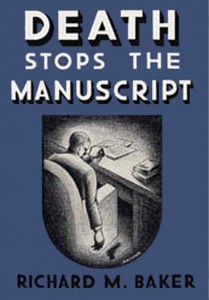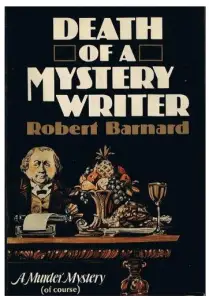Biblios = Books about Books
- Part 1: Books about Books–Better Known as Biblios
- Part 2 Biblios Focusing on Booksellers/Collectors
- Part 3 Biblios Focusing on Writers
- Part 4 Bibilos Focusing on Writers
- Part 5 Bibilos Focusing on Publishing
 Writers love killing off other writers, especially those who are more successful than they are, I would guess. I can imagine quite a few authors fantasizing Patricia Cornwell’s demise, or maybe even James Patterson’s, although so many writers are employed by him, that may be cutting off your writer’s cramp to spite your writer’s block, or something much wittier than that. But in the realm of biblio mysteries, there are many books dealing with authors, publishers, editors, etc etc. where the victim is a writer him or herself.
Writers love killing off other writers, especially those who are more successful than they are, I would guess. I can imagine quite a few authors fantasizing Patricia Cornwell’s demise, or maybe even James Patterson’s, although so many writers are employed by him, that may be cutting off your writer’s cramp to spite your writer’s block, or something much wittier than that. But in the realm of biblio mysteries, there are many books dealing with authors, publishers, editors, etc etc. where the victim is a writer him or herself.
One that pops to mind immediately because it was recently on my Best 100 Mysteries of All Time list–Helen Reilly’s Mr. Smith’s Hat. Although the victim technically writes for pulp magazines, he had at one time tried his luck at straight fiction. Here’s a mystery that reminds me of one of those Russian wooden doll boxes–a box within a box within a box–but the Russian one gets smaller and smaller, in this novel, the action grows. Run For Your Life, Barbara Abercrombie,1996 begins with an author preparing for a marathon run, while working on a thriller manuscript where the protagonist is also running in a marathon. Wait, it gets sillier. Her manuscript is stolen and one day she is almost run down by a car, as the protagonist is almost run down in her book. The brilliant writer, Val McDermid used a similar theme in her title, Booked For Murder. However in her book the author herself is murdered in the exact way she described in her to be published book. If I had to pick one of the two, McDermid would be the glaring choice. Her work continues to get stronger with each title. With a slight connection to these themes, Nathan Crosby’s Fan Mail, M. S. Power, 1982, Gideon Turner decided to imitate Dick Francis’ genre and write about horse racing, Surprised at his success, his bliss is dampened by someone writing letters to his fictional protagonist signed by the name of his fictional Murderer, Except for the horse racing stuff, this one sounds quite interesting.
Marion Babson, a witty writer of British traditional mysteries, gives us three areas of biblio for our bucks. Weekend for Murder, 1985 English mystery weekend(1) sponsored by an American crime fiction bookstore, (2) attended by mystery fans, and two writers.(3)
Self explanatory title–Death Stops the Manuscript, Richard M. Baker, 1936. Stopped indeed. A manuscript begun by a scholar in his own library, is abruptly halted by murrr–der! I have a copy of this, not yet read, or I’d go into more details, maybe even a spoiler! From polite clue finding mystery to rather adult sleaze, Mr. Right, Carolyn Banks, 1979. Of course it would be the 70s, that’s when people thought sleeping with 30 men was nothing of interest. That’s what Lida’s empty life has been up until she starts corresponding with a sadomasochistic thriller writer. Oh and one of her lover castoffs just could be the murderer, surprise surprise.
Robert Barnard is certainly not involved with the distasteful underbelly of life, he’s too urbane and sly to need sensationalism to gain interest in his work. Death of a Mystery Writer (US title), 1978 is a highlight of writer biblios. A mystery writer loved by fans, but hated by a small circle of enemies is murdered. His son, standing to gain quite a sum at his father’s demise, won’t collect on his father’s manuscript worth a million, it’s missing. Barnard, a fan favorite, pens a real delight,
highlight of writer biblios. A mystery writer loved by fans, but hated by a small circle of enemies is murdered. His son, standing to gain quite a sum at his father’s demise, won’t collect on his father’s manuscript worth a million, it’s missing. Barnard, a fan favorite, pens a real delight,
The Man Who Would Be F. Scott Fitzgerald, David Handler, 1990. A first time author who has a style comparable to Fitzgerald’s is ‘discovered’ by the literati. With fame came disinterest in writing a promised second novel, so ‘Hoagy’ Hoag is hired to ghostwrite for the lazy author, an expose on the megabuck book deals and their rather unscrupulous machinations. That touches nerves and murder strikes, again and again. This title won the Mystery Writer’s of America Edgar for Best Paperback Original in 1990. David Handler has worked in TV, with some of the uh, glittering stars therein. His personal insight when we met, was fascinating.
Many of the writer biblios focus on the manuscript as opposed to the writer himself. As if what was written transcends the writer. Another title that is concentrating on a missing pre-book, Shoot The Piper, Richard Hill, 1994, involves a PI hired to find the manuscript, the advance money for that work, and, oh, yeah, the author himself who disappeared while on a book tour. Uh-Oh. Another. Missing manuscript and brother–The Finish Line, Paul Kruger, 1968. OK, this next one cuts out the manuscript and goes for just plain missing. An author takes a writing class, disappears. His wife trying to locate him, takes the same class, also disappears. And one would assume considering the lack of name recognition for the author, Fred Levon, that Fred’s book, Much Ado About Murder also disappeared quite quickly.
Sometimes the writer in the mystery is peripheral to the main story, yet still considered a biblio. Panic, Bill Pronzini, 1972. involves the detective, Nameless–yes nameless, because the excellent author Pronzini never gives him a name, and no one says his name in the books, therefore, Nameless–is trying to find a runaway husband who has been hiding out with a children’s book writer. This tenuous thread, and the fact that Nameless has a pulp fiction collection to his unspoken name, gives us all the biblio we are going to get in this one. I love Pronzini’s stand alones and have not really sampled his Nameless novels, but look forward to doing so.
I think this does it for right now–I do have many more writer, publisher, etc biblios, but my eyes will cross if I try to keep adding them to this article, Keep an eye out for Part 4!

Thank you for this list of potential reads!
You are more than welcome, Nancy! Although, I would hesitate on some of them, lol. Pronzini is always a good bet, as is Bernard. Babson can be too tame at times, a McDermid too graphic. Handler is pleasant, and the other creaky old titles, who knows? LOL.